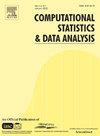Bayesian grouping-Gibbs sampling estimation of high-dimensional linear model with non-sparsity
IF 1.5
3区 数学
Q3 COMPUTER SCIENCE, INTERDISCIPLINARY APPLICATIONS
引用次数: 0
Abstract
In high-dimensional linear regression models, common assumptions typically entail sparsity of regression coefficients . However, these assumptions may not hold when the majority, if not all, of regression coefficients are non-zeros. Statistical methods designed for sparse models may lead to substantial bias in model estimation. Therefore, this article proposes a novel Bayesian Grouping-Gibbs Sampling (BGGS) method, which departs from the common sparse assumptions in high-dimensional problems. The BGGS method leverages a grouping strategy that partitions β into distinct groups, facilitating rapid sampling in high-dimensional space. The grouping number (k) can be determined using the ‘Elbow plot’, which operates efficiently and is robust against the initial value. Theoretical analysis, under some regular conditions, guarantees model selection and parameter estimation consistency, and bound for the prediction error. Furthermore, three finite simulations are conducted to assess the competitive advantages of the proposed method in terms of parameter estimation and prediction accuracy. Finally, the BGGS method is applied to a financial dataset to explore its practical utility.
非稀疏性高维线性模型的贝叶斯分组-吉布斯抽样估计
在高维线性回归模型中,通常的假设要求回归系数 β∈Rp 具有稀疏性。然而,当大部分(如果不是全部)回归系数都是非零时,这些假设可能就不成立了。专为稀疏模型设计的统计方法可能会导致模型估计出现严重偏差。因此,本文提出了一种新颖的贝叶斯分组-吉布斯采样(BGGS)方法,它偏离了高维问题中常见的稀疏假设。BGGS 方法利用分组策略将 β 分成不同的组,从而促进在高维空间中的快速采样。分组数(k)可通过 "肘图法 "确定,该方法运行高效,且对初始值具有鲁棒性。在一些常规条件下,理论分析保证了模型选择和参数估计的一致性,以及预测误差的约束。此外,还进行了三次有限模拟,以评估所提出方法在参数估计和预测精度方面的竞争优势。最后,将 BGGS 方法应用于一个金融数据集,以探索其实用性。
本文章由计算机程序翻译,如有差异,请以英文原文为准。
求助全文
约1分钟内获得全文
求助全文
来源期刊

Computational Statistics & Data Analysis
数学-计算机:跨学科应用
CiteScore
3.70
自引率
5.60%
发文量
167
审稿时长
60 days
期刊介绍:
Computational Statistics and Data Analysis (CSDA), an Official Publication of the network Computational and Methodological Statistics (CMStatistics) and of the International Association for Statistical Computing (IASC), is an international journal dedicated to the dissemination of methodological research and applications in the areas of computational statistics and data analysis. The journal consists of four refereed sections which are divided into the following subject areas:
I) Computational Statistics - Manuscripts dealing with: 1) the explicit impact of computers on statistical methodology (e.g., Bayesian computing, bioinformatics,computer graphics, computer intensive inferential methods, data exploration, data mining, expert systems, heuristics, knowledge based systems, machine learning, neural networks, numerical and optimization methods, parallel computing, statistical databases, statistical systems), and 2) the development, evaluation and validation of statistical software and algorithms. Software and algorithms can be submitted with manuscripts and will be stored together with the online article.
II) Statistical Methodology for Data Analysis - Manuscripts dealing with novel and original data analytical strategies and methodologies applied in biostatistics (design and analytic methods for clinical trials, epidemiological studies, statistical genetics, or genetic/environmental interactions), chemometrics, classification, data exploration, density estimation, design of experiments, environmetrics, education, image analysis, marketing, model free data exploration, pattern recognition, psychometrics, statistical physics, image processing, robust procedures.
[...]
III) Special Applications - [...]
IV) Annals of Statistical Data Science [...]
 求助内容:
求助内容: 应助结果提醒方式:
应助结果提醒方式:


